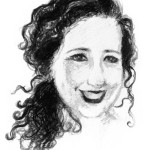The book caught my eye. It was red, and large, and in Hebrew. A book of poetry. Who else is reading Hebrew poetry, I wondered, glancing at the name of the person who had requested it from the Sterling Memorial Library. Taken aback, I saw the name of an old professor, a man who I had never before suspected of knowing Hebrew or liking poetry. Suddenly, the moment felt intimate. I had trespassed on knowledge not meant for me.
 This year, due to the construction in Sterling, the book request service has become self-serve. What this means is that instead of picking up books from the front desk — like we did before the recent renovations — you head to the back room of the new publications room (the old publications room, by the way, is reopened and beautiful), and find your name along the alphabetized stacks. Each book you have ordered is waiting for you, and your name is inserted into the book on a slip of paper. It’s efficient, easy and might outlast the temporary construction changes. Accidentally flicking through the names of others is unavoidable.
This year, due to the construction in Sterling, the book request service has become self-serve. What this means is that instead of picking up books from the front desk — like we did before the recent renovations — you head to the back room of the new publications room (the old publications room, by the way, is reopened and beautiful), and find your name along the alphabetized stacks. Each book you have ordered is waiting for you, and your name is inserted into the book on a slip of paper. It’s efficient, easy and might outlast the temporary construction changes. Accidentally flicking through the names of others is unavoidable.
It has also made public information that was once private.
I have been surprised this year by how strange it feels to see the choices of others. As I’ve scanned the “T” section, collecting even more books for my thesis, I’ve noticed books on Chinese art waiting for philosophical friends, books on mathematical equations designated to the TA who once ran a section in my religious studies lecture, or even the more expected British novels awaiting a friend writing a thesis on British literature. I’ve had to wander through the books ordered by professors whose courses I’ve only shopped, or other students whose names I know from the emails they send, if not by face. It’s weird. It’s like when you see the Gmail account of someone in seminar or look through a passing window into a first floor bedroom. In some ways, to know what another is reading is to gain insight into their mind.
W. Somerset Maugham, one of the great British writers of the late 18th century, wrote a fictionalized memoir called “The Razor’s Edge,” which in a somewhat roundabout way documents the life of Larry, a wealthy boy in search of meaning. At one point, Maugham the character is speaking with Larry’s soon-to-be jilted widow, and she is trying to recall a name that Larry had mentioned to her. In the novel, she wonders if this was a friend of Larry’s she had forgotten, but Maugham recognizes the name as an ascetic philosopher, and immediately understands the turns of Larry’s mind. He knows at that moment Larry will leave her.
The question of “What are you reading now?” is at its best an intimate question. If we are in the game of believing that ideas matter, then the ideas we pursue are more revealing than any bikini. Our books indicate what we are, currently, taking seriously in the realm of thought. The shelves in the back of Sterling are sagging with the weight of personal interests, random curiosity and academic necessity.
I’ve since avoided, in some ways, connecting the books I see with the people who requested them, feeling a sense of impropriety in knowing this information from those who have not actively chosen to share it with me. I don’t know how the system will change when Sterling reverts back to its regular, beautiful self. But for this brief moment among the change, I’ve been reawakened to the power of the books we read.
Shira Telushkin is a senior in Pierson College. Her column runs on alternate Thursdays. Contact her at shira.telushkin@yale.edu .







